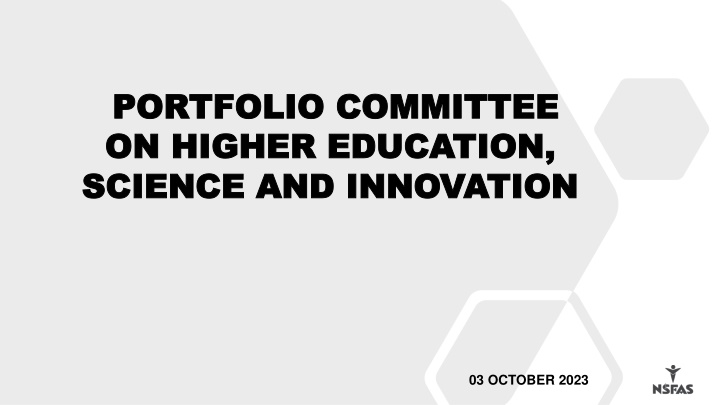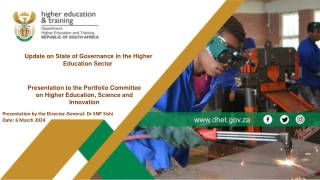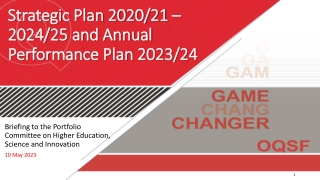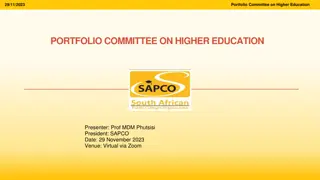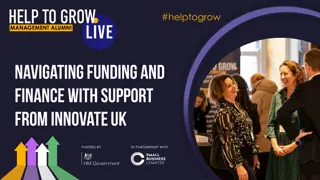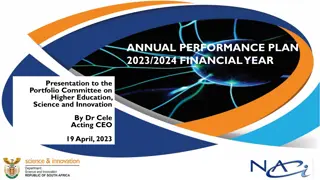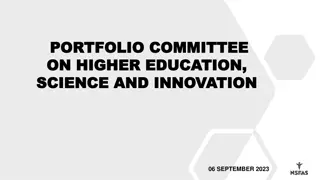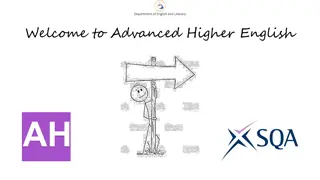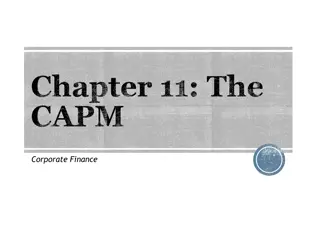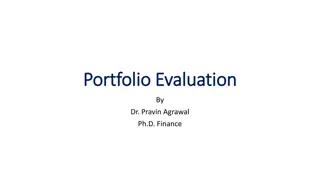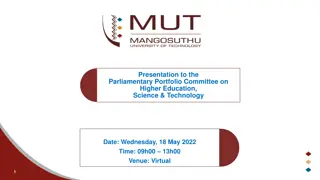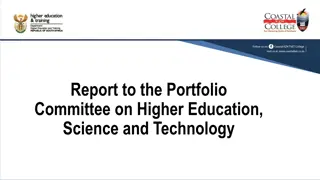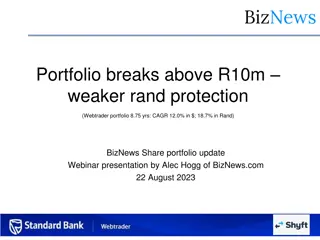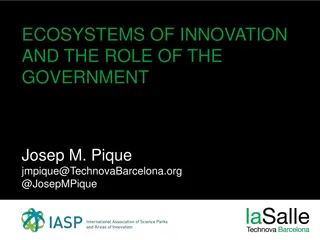PORTFOLIO COMMITTEE ON HIGHER EDUCATION,SCIENCE AND INNOVATION
The portfolio committee on higher education, science, and innovation discusses plans to address problems related to direct payments and outlines types of allowances paid via direct payments to university and TVET college students. Furthermore, the plan to resolve direct payment challenges involves a 7-step process initiated by NSFAS to improve the distribution of allowances to students. Teams have been formed to investigate student challenges and report back to the NSFAS Board for further action.
Download Presentation

Please find below an Image/Link to download the presentation.
The content on the website is provided AS IS for your information and personal use only. It may not be sold, licensed, or shared on other websites without obtaining consent from the author.If you encounter any issues during the download, it is possible that the publisher has removed the file from their server.
You are allowed to download the files provided on this website for personal or commercial use, subject to the condition that they are used lawfully. All files are the property of their respective owners.
The content on the website is provided AS IS for your information and personal use only. It may not be sold, licensed, or shared on other websites without obtaining consent from the author.
E N D
Presentation Transcript
PORTFOLIO COMMITTEE PORTFOLIO COMMITTEE ON HIGHER EDUCATION, ON HIGHER EDUCATION, SCIENCE AND INNOVATION SCIENCE AND INNOVATION 03 OCTOBER 2023 1
PLAN TO RESOLVE PROBLEMS RELATED TO DIRECT PAYMENTS 2
TYPES OF ALLOWANCES PAID VIA DIRECT PAYMENTS NSFAS pays the below allowances to university students via direct payments: Living allowances Book allowances Meal allowances Travel allowances TVET College students are paid the below allowances via direct payments: Living allowances Private accommodation Personal care Transport allowances 3
PLAN TO RESOLVE DIRECT PAYMENT CHALLENGES NSFAS took over direct payments at TVET Colleges in November 2022 and at universities in June 2023. Though there has been support from the TVET Colleges, there has been some resistance from some student formations in the university space. Despite this resistance, the organization has made strides in the onboarding of students for them to receive their allowances each month. NSFAS took note of the challenges that are continuously being raised by students and institutions regarding direct payments and the NSFAS Board devised a 7-step process. 4
PLAN TO RESOLVE DIRECT PAYMENT CHALLENGES Cont. The 7-step process is outlined below: Formation of 2 teams to report directly to the Acting CEO regarding the student challenges (Done) The teams should visit at least 10 universities and 20 TVET Colleges over 10 days, starting Monday 11 September until Friday 22 September, to observe the challenges on the ground (the teams should be there the whole day and listen to the students challenges) (Done) The teams to report back to the Acting CEO in a written report. The Acting CEO, having reviewed the report, develops a response strategy. The Acting CEO reports to the Board. (Week starting 09 October) The Board, having applied its mind and having made amendments, then develops its own report to the Minister. Conditional on the shareholders thoughts based on the outcomes of the steps taken above, the outcome be made public. 5
PLAN TO RESOLVE DIRECT PAYMENT CHALLENGES Cont. The teams were formed and included members from senior management in operations, those that deal with appeals, servicing administrators that work with specific institutions, data analysts, communications, and the direct payment partners. University KYC completed stats were mostly above 90% except for a few universities, such as, University of Fort Hare, North West university and Unisa. At TVET Colleges, the KYC completed stats were at 79% overall. TVET colleges have multiple academic terms within one academic year and that with each of these academic terms there is new student intakes, also plays a role in there being a number of students still having to complete their KYC, at any given point. 6
PLAN TO RESOLVE DIRECT PAYMENT CHALLENGES Cont. The 10 Universities that were visited are: Mandela University, Rhodes University, Mangosuthu University of Technology, Durban University of Technology, University of Venda, Wits University, Central University of Technology, North West University, Sefako Makgatho University and University of Pretoria. The 29 TVET Colleges that were visited are: Capricorn, King Hintsa, Umfolozi, Motheo, Sekhukhune, Coastal, CJC, Taletso, Tshwane North, Buffalo City, False Bay, Nkangala, Thekwini, Majuba, Letaba, Mopani, Goldfields, Ikhala, King Sabata Dalindyebo, Elangeni, South West Gauteng, Ekurhuleni West, Vuselela, Gert Sibande, Vhembe, Maluti, Mthashana, Northlink and College of Cape Town. 7
PLAN TO RESOLVE DIRECT PAYMENT CHALLENGES Cont. Although the detailed report is going to the CEO, the following are general observations. The NSFAS teams that visited the institutions met with the financial aid management, bursary officers and Student Representative Councils (SRC s) where challenges from students were presented for resolution. The challenges experienced by students across the institutions are: 1. Slow distribution of bank cards. 2. Cyber-attacks - Instances of cyber-attacks threaten student accounts, system integrity issues and cases of alleged fraud. 3. Non-responsiveness / Delays in Query Handling. 8 4. Partner Capacity Limitations resources on the ground
PLAN TO RESOLVE DIRECT PAYMENT CHALLENGES Cont. 6. NSFAS Data Remediation Impact - Defunding and funding status changes strained the relationship between NSFAS and the stakeholders and affects the integrity of the direct payment method as students are not able to differentiate between NSFAS and partner glitches. Students NSFAS portal reflecting a funded status, while the NSFAS internal system reflects the student as not funded leads to the student details not being sent to the partner for onboarding. 7. Underage Students' Onboarding process There was a delay between NSFAS and the partners coming up with a FICA compliant process to KYC underage students. 8. Excessive bank charges. 9
SOLUTIONS TO THE CHALLENGES 1. The distribution of bank cards has been prioritized with partners going to campuses. It was delayed as some student leaders had disrupted the distribution at some universities by vandalizing the cards and threatening the teams that were on the ground and chasing them out of the universities. 2. Instances of alleged fraud are being investigated by the NSFAS forensic unit. Partners have increased their cyber security measures. 3. NSFAS has requested the partners to create a dashboard specifically giving NSFAS the information it needs for reporting. This will enable NSFAS to respond speedily to challenges raised by institutions and students. This will also alleviate the issue of non-responsiveness of the partner call centres and query handling mechanisms as institutions will be receive reports directly from NSFAS and will, therefore, be in a position to respond to their students speedily. 4. NSFAS will send out servicing administrators, together with resources from the partners to assist with student queries, KYC and the distribution of cards during October so that challenges are resolved before the exam period. NSFAS would like the exam period to be as seamless as can be, so that students are not stressed by issues regarding their allowances. 10
SOLUTIONS TO THE CHALLENGES Cont. 5. NSFAS servicing administrators and data analysts are working with the institutions to fix the registration and adjustment template errors to enable a seamless disbursement process for the payment of allowances. 6. NSFAS is working extensively at gaining student confidence through proper working systems and integration between the student portal and internal system. 7. Partners have put in place a simplified onboarding mechanism for underage students. 8. Excessive bank charges - response is on the next slides. The institutional support teams continue to hold bi-weekly meetings with the FAO s and the partners. 11
FEES JOURNEY The program initially introduced an R89-00 fee bundle that included in excess over 30 free transactions. In October 2022, a R29-00 fee bundle was introduced with 12 free transactions. Student leadership were consulted to ensure the NSFAS beneficiaries transacted with the best suited fees model. In June 2023 a R12-00 fee account and pay as you transact fees model was adopted. All fees out of bundle being transparent and agreed upon. 12
BANK FEES Partners and NSFAS embark on a programme to education beneficiaries on how to effectively and efficiently utilize their bank account to eliminate exposure to fraud and unnecessary bank charges. NSFAS is still in consultation on measures to decrease fees. 15
UPDATE ON APPEALS 17
PLANS TO IMPROVE ICT SYSTEMS 20
IMPROVEMENT OF ICT SYSTEMS Currently NSFAS confirms applicant identity through a 3-point verification process by checking provided ID number, Name, Surname, confirms parental/spouse relationship using Department of Home Affairs data. This process has limitations as NSFAS is only allowed to send 2500 real-time requests per hour. Once that limit has been reached, a manual process (file exchange via SFTP) is followed for identity verification. This verification is not done against warm bodies. This has proven to be problematic and risky as some of the students copy of identification documents has been compromised through fraudulent activities and phishing. Fraudsters are enabled to pretend as valid applicants and bypass the current 3-point verification process and taking over applicant s application process. The system will be enhanced to enable biometric authentication, parental and spouse relationship confirmation and validation of income earned. Income earned includes formal employment income, informal employment income where recorded, as well as investment income. Current household income verification and validation process uses SARS and Credit Bureau services and has a dependency on SARS completing its yearly tax assessment process. This verification process is done manually through a batch file process where data is exchanged between NSFAS and third parties. This introduces delays on processing of applications and making funding decisions. 21
IMPROVEMENT OF ICT SYSTEMS With other upcoming releases, system enhancements will be done to ensure applications are pre- processed using third party data such as DBE to assess potential NSFAS beneficiaries before the applications cycle opens. This will ensure potential NSFAS beneficiary will be notified before they transition to TVET sector or write their final matric exams that they have been identified as potential beneficiaries and asked if they would like to be confirmed as beneficiaries. This will minimize the impact on applications process as it is currently done, which has proven to be problematic and creates a huge dependency on NSFAS especially during institutions of higher learning registrations period. The system will be enhanced to ensure integration with institutions systems to enabled real-time data exchange between NSFAS and institutions. This will reduce the dependency on institutions availing registrations data which comes with its complexities such as delayed disbursements to students. Enhanced internal systems to ensure a single-source of truth enabling NSFAS contact centre to efficiently respond to student queries. 22
STUDENT ACCOMMODATION ACCREDITATION 23
UPDATE ON STUDENT ACCOMMODATION ACCREDITATION The total number of beds applied for on the portal is 247 835. The total number of beds that have been paid for is 69 590. The total number of accredited beds is 25 803. The accreditation of beds has been slow because it was a manual process. NSFAS stopped the manual process and had to ingest the accreditation reports that were already done manually into the system whilst developing an accreditation tool on the system. The accreditors are being allocated work for them to start with the accreditation on Monday 09 October 2023. 24
THANK YOU 25
